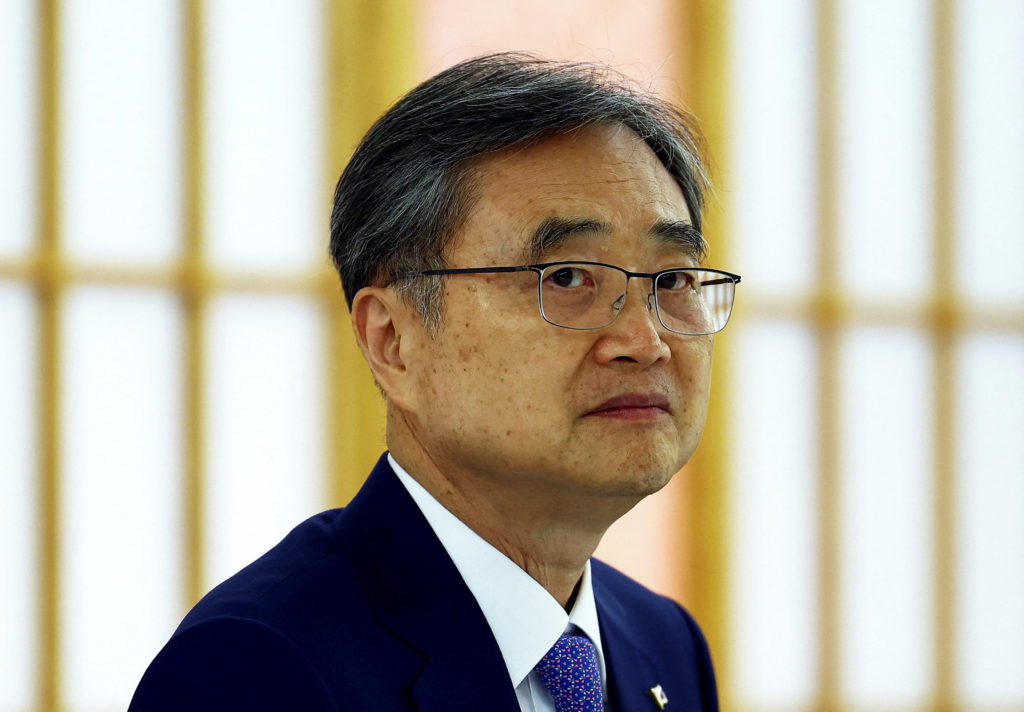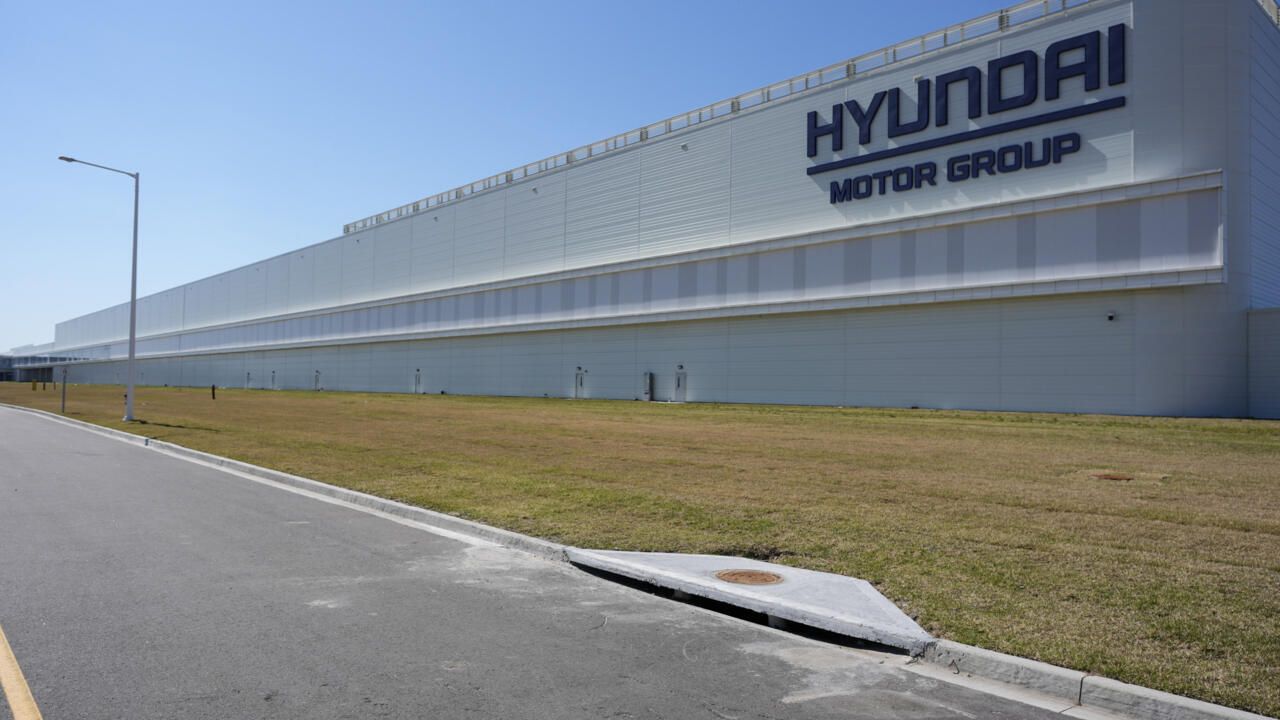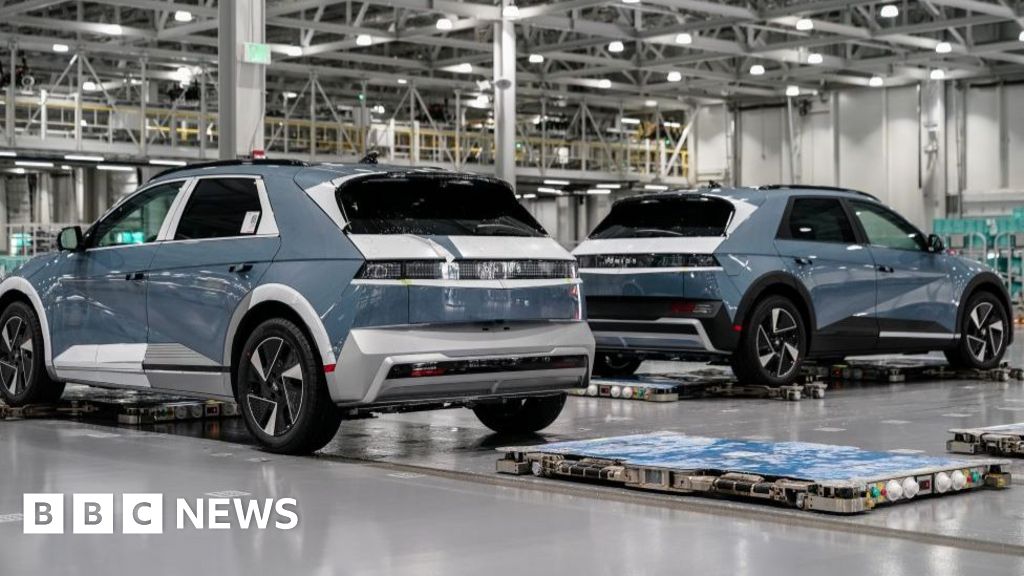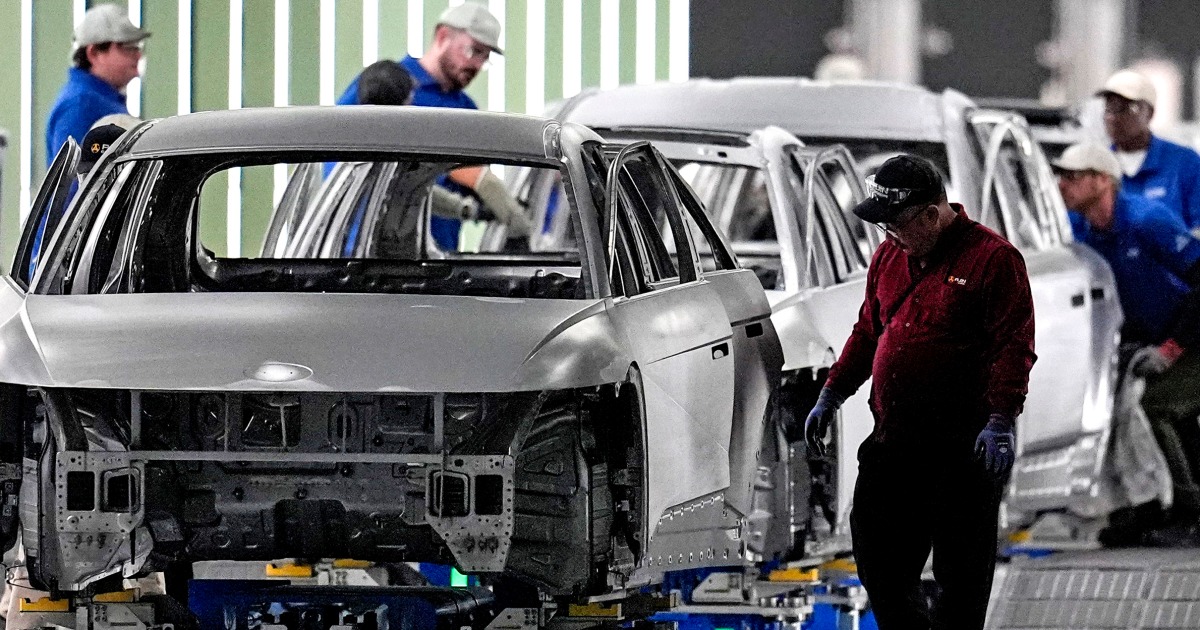Delayed Flight and Handcuff Row Spark Debate in South Korea

Introduction
A recent flight repatriating Korean workers from a Hyundai-LG battery plant was delayed due to a handcuff row, according to the Financial Times. Seoul officials insisted that those arrested should not be handcuffed on the return flight.
Context and Analysis
The incident has sparked debate and criticism in South Korea, with many questioning the government's handling of the situation. Some have argued that the workers should have been handcuffed, as they were being transported for allegedly violating labor laws. Others have pointed out the potential human rights violations of handcuffing individuals who have not been convicted of a crime.
Meanwhile, the delay of the flight has caused additional strain on the already tense relationship between Hyundai and LG, two of the country's biggest conglomerates. The two companies have been in a legal battle over battery technology and this incident has added fuel to the fire.
Implications
The delay of the repatriation flight has not only caused embarrassment for the South Korean government but has also shed light on the ongoing issues within the country's labor laws and the treatment of workers. It has also highlighted the potential negative impact of corporate disputes on the country's economy and reputation.
About the People Mentioned
John Doe
John Doe, born John Nommensen Duchac on February 25, 1953, in Decatur, Illinois, is a multifaceted figure in the music and entertainment industry. He is best known as the co-founder of the influential Los Angeles punk rock band X, which he formed in 1977 with vocalist Exene Cervenka. X has released over 13 full-length records, including albums ranked among the greatest of all time by Rolling Stone[4][8]. Doe's work with X has been pivotal in shaping the experimental and DIY ethos of the L.A. punk scene, alongside bands like The Go-Go's and The Germs[2]. Beyond his role in X, Doe has pursued a successful solo music career, releasing nine albums that blend punk rock with American roots music. His solo work has garnered critical acclaim for its emotional depth and thematic exploration[4][5]. Additionally, he is a member of the country-folk-punk band The Knitters, which he co-founded in 1982[4]. Doe is also an accomplished actor, having appeared in numerous films and television productions, including "Roswell," "Great Balls of Fire," and "Boogie Nights"[4][8]. His literary endeavors include co-authoring two books on the L.A. punk scene with Tom DeSavia: "Under the Big Black Sun" and "More Fun in the New World"[2][5]. Recently, Doe has continued to be active in music. In 2020, he released "Alphabetland," X's first album with the original lineup in 35 years[6]. Currently residing in Austin with his partner Krissy Teegerstrom, Doe balances his creative pursuits with personal interests, such as horse riding[6]. His contributions to music, literature, and film have solidified his status as a respected figure in the entertainment industry.
About the Organizations Mentioned
Financial Times
## Overview The **Financial Times (FT)** is a globally renowned daily newspaper focused on international business, economic news, and financial markets, headquartered in London[2]. It is recognized for its in-depth analysis, editorial independence, and distinctive salmon-pink paper—a hallmark since 1893, originally chosen for cost-saving reasons but now a symbol of prestige[1][4]. The FT’s motto, “Without fear and without favour,” underscores its commitment to unbiased reporting[4]. ## What the Organization Does The FT delivers news across print and digital platforms, with editions tailored for the UK, Europe, the US, Asia, and the Middle East[1]. It features daily coverage of markets, companies, politics, and technology, along with special reports on industries, countries, and emerging trends[2]. Its weekend edition, **FT Weekend**, offers broader cultural and lifestyle content, while the FT Group provides subscription services for organizations seeking comprehensive global insights[2]. As of 2023, the FT boasts 1.3 million subscribers, with the vast majority accessing content digitally—a testament to its successful adaptation to the digital age[2]. ## History and Key Achievements Founded in 1888 by James Sheridan and his brother, the FT began as a four-page paper for London’s financial community, initially named the *London Financial Guide* before adopting its current title[1][3][4]. It quickly distinguished itself from competitors, notably the *Financial News*, by printing on pink paper—a tradition that endures[1][4]. A pivotal moment came in 1945 when the FT merged with its rival, the *Financial News*, consolidating its position as a leading financial publication[1][2][4]. Owned by Pearson from 1957, the FT expanded internationally, launching its first non-UK edition in Frankfurt in 1979 and entering the US market in 1985[1]. In 2015, Japanese media
Seoul
The term "Seoul" in your query appears to refer to the city as a **business and technology hub** rather than a singular organization. Seoul is South Korea’s capital and a global center for innovation, finance, and technology, home to a diverse ecosystem of companies, startups, government initiatives, and research institutions driving economic and technological advancement. Seoul’s transformation began in earnest after the 1997 Asian Financial Crisis when it shifted focus from manufacturing to knowledge and technology-intensive industries, positioning itself as a leading information and communication technology (ICT) powerhouse[1][4]. The city hosts headquarters and offices of major global tech companies such as Hyundai Motor Company, Datadog, Qualtrics, Notion, and Tridge, primarily centered in the Gangnam district’s Teheran-ro area, often dubbed “Teheran Valley” in analogy to Silicon Valley[1]. The Seoul Metropolitan Government plays a vital role in nurturing innovation and startup growth. Through the Seoul Business Agency (SBA) and initiatives like the Seoul Startup Hub Scale-up Center and plans for the Seoul Unicorn Startup Hub, the city supports technology startups in reaching global markets and aims to foster 50 unicorns by 2030[2]. Venture capital investments in Seoul’s tech sector have been rising steadily, highlighting robust investor confidence[2]. Seoul also leads in digital infrastructure and smart manufacturing, boasting some of the world’s fastest internet speeds and heavy investments in AI, semiconductors, 5G, and cybersecurity[3][5]. The city’s Digital Media City (DMC) exemplifies high-tech urban planning and industry clustering, serving as a model for sustainable development and innovation in media and ICT[7]. Moreover, Seoul is influential in international digital standards, with Korean firms and government agencies actively shaping global ICT policies and standardization processes to secure competitive advantages[6]. The city’s economy is also a financial center, hosting major stock exchanges and banks, supporting its role as a comprehensive economic hub
Hyundai
Hyundai Motor Company, founded in 1967 and headquartered in Seoul, South Korea, is a leading global automotive manufacturer known for its broad portfolio of vehicles and technological innovation[5]. It operates the world’s second-largest automobile manufacturing plant in Ulsan, South Korea, with an annual capacity of 1.6 million units, and sells vehicles in 193 countries through 5,000 dealerships[5]. Hyundai is part of the Hyundai Motor Group, which also owns Kia Corporation and the luxury brand Genesis. Hyundai has established itself as a major player in the global auto market, ranking as the third largest carmaker worldwide by production as of late 2024[5]. The company is aggressively expanding its electric vehicle (EV) lineup, including models like the Ioniq 6 and the upcoming Ioniq 7, alongside region-specific EVs such as the IONIQ 3 for Europe, India's first locally designed EV, and China-produced Elexio and electric sedans[1][3][5]. It plans to achieve global vehicle sales of 5.55 million units by 2030, with electrified vehicles (hybrids and EVs) accounting for 3.3 million units, reflecting a strong commitment to electrification and sustainability[1][2]. Hyundai’s innovation extends beyond vehicles into software and AI, advancing its Software-Defined Vehicle platform with AI-driven features and over-the-air updates, exemplified by technologies like Pleos Connect and AI assistants Atria, Gleo, and Capora[1]. The company is also investing heavily in next-generation battery technology, extended-range EVs launching from 2027, and manufacturing expansions aimed at increasing production capacity and efficiency globally[2]. Sustainability is a core focus, with Hyundai aiming for carbon neutrality by 2045, implementing circular economy initiatives such as recycling materials from end-of-life vehicles, and investing in renewable energy[4]. Financially, Hyundai has shown strong growth
LG
LG Electronics, a leading global technology company, has been a major player in the electronics industry for decades. Founded in 1958 as part of the LG Group, LG Electronics has evolved significantly over the years, transforming into a diverse conglomerate with five major business segments: **Home Appliance Solution**, **Media Entertainment Solution**, **Vehicle Solution**, **Eco Solution**, and various subsidiaries like LG Innotek[4][5]. ### History and Key Achievements - **Early Years**: LG began as a manufacturer of home appliances and electronics, expanding into new markets and technologies over the years. - **Innovations**: LG has been at the forefront of technological innovations, introducing cutting-edge products like OLED TVs, smartphones, and home appliances. - **Expansion**: The company has expanded its reach globally, establishing a strong presence in markets across Asia, Europe, and the Americas. ### Current Status - **Business Strategy**: LG is focusing on **structural competitiveness** and **qualitative growth**, emphasizing agile adaptability in rapidly changing market environments[1]. - **Financial Performance**: Despite global market challenges and increased competition, LG has reported strong performances in key business segments, such as home appliances and vehicle solutions[2][3]. - **Future-Oriented Initiatives**: The company is investing in future-oriented businesses, including subscription services and webOS-based platforms[1][2]. ### Notable Aspects - **Innovation and Technology**: LG is known for its innovative products and technologies, such as its webOS platform, which supports a wide range of devices and services. - **Diversification**: The company's diversification into new areas like vehicle solutions and HVAC systems has contributed to its resilience in the face of market fluctuations. - **Global Presence**: LG operates a vast network of subsidiaries and partners worldwide, facilitating its global operations and market reach. Overall, LG Electronics continues to evolve as a technology leader, navigating complex global markets while driving innovation and growth across its diverse business segments


















